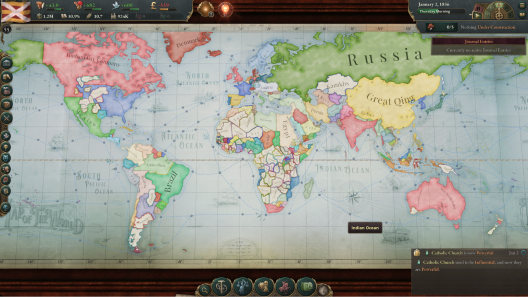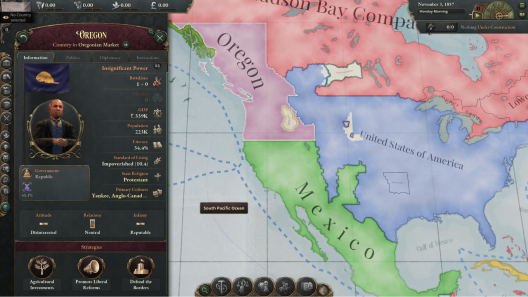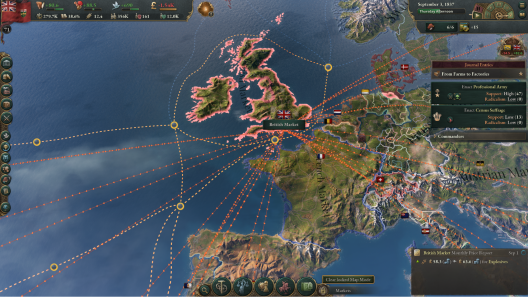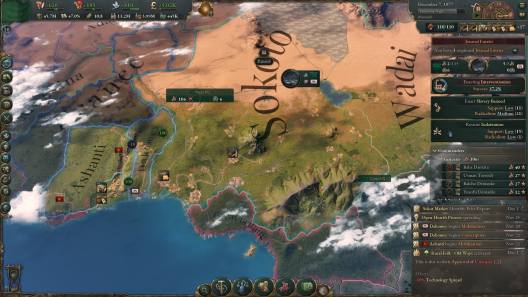Virtual History: Gaming as a way to understand history and policy
Imagine you could change history. You have been put in control over a country and have 100 years to guide its citizens into the future. What do you do? Do you pass laws that move your people into a more egalitarian society? Do you establish trade routes and make your nation an industrial powerhouse? Do you invade your neighbors or enact peace?
In the world of grand strategy or historical simulation games, you get to choose. If the game is modeled in a way that reflects the “real world,” then these gaming experiences teach the player about history and policy, prompting them to think about the “what ifs” of our past. Historical simulation gaming originates from tabletop military wargames and can also be used to simulate other forms of conflict. Wargames were originally designed as teaching and research tools for military officers, and over time these same types of games have diverged into professional games for military training and recreational games. The most popular games in this category are strategy games like the computer-based Civilization series, started in 1991 and is currently in its 13th installment.
While computer and board game versions of historical simulation games are more commercially popular, the use of gaming for teaching and research continues to evolve. Recently the National Academies of Science, Engineering, and Medicine conducted a simulation to achieve net zero carbon in the Gulf of Mexico. Wargame simulation has also been used to explore the conflict over illegal, unreported, and unregulated (IUU) fishing by the Pew Trust, Georgetown University, and the Center for Naval Analysis. Gaming as an academic and educational tool is a growing approach, including courses and deep discussions of colonialism. Here at the University of Washington, the EarthGames Center strives to incorporate the latest scientific research into video and board games to “teach and inspire players about the natural world and our role within it.”
There are many examples of historical simulation games to explore. A recent example is Victoria 3 by Paradox Interactive, which was released in October 2022. Victoria 3 allows the gamer to play as one of over 100 countries and spans the time of 1836-1936. Global in scale, it focuses on economics, population demographics, and politics. Themes of colonization, industrial development, technological change, war, natural disasters, and human rights are explored as you play. Both authors of this article recently played Victoria 3 and connected over critiques of the game. We thought we would discuss why we play these types of games and how they inform the topics we study. We decided to write this article when we realized that our discussion of the game was heavily influenced by a course we both took last winter, “Geographies of Racial Capitalism,” with Professors Carrie Freshour and P. Joshua Griffin. Below is a transcript of the conversation we had to explore concepts such as the purpose and lessons learned from playing these games.

Photo Credit: Screenshot taken by Kurt Ellison, used with permission from Paradox Interactive.
Why do you play these types of games?
Kurt: The short answer is to solve puzzles and tell a story. I tend to be drawn to games that take place in time periods in which I have some background knowledge. I like to see how history plays out, even if, in the game, it can be both abstract and different from actual history. The comparison between the two can be instructive. Games like Victoria 3 allow the player to explore alternative history, and I find those thought experiments engaging. What I find really fascinating is when games inspire new discussions about our world. One example is a recent dialogue about how communism works in Victoria 3. Online, some players complained that implementing a communist economy was “too strong.” The game designers responded that, “we just implemented the mechanics the way we understood them.” They also stated that “it is not a complete simulation. There are currently no distinct mechanics modeling corruption or cronyism, foreign economic influence beyond trade, or direct interference in another nation’s politics.” While other players mentioned how their views about policy have changed, stating, “Damn, this game made me value subsidies and welfare [in real life].” Discussions like this demonstrate how games have the potential to raise new and important questions for players to explore.
Xavier: They are fun! This should be the first reason you play any game or pursue a hobby. But also, I am kind of a nerd. I like maps and history, and these types of games speak to certain kinds of people who find it engaging to explore alternative history. In addition, the strategy aspect is really enjoyable; games like Victoria 3 make you think about the historical context in which you are playing as well as having you contend with the mechanics of the actual game. This combination leads to amusing playthroughs and engaging discussions with people who share this hobby.

What do you see as an advantage or disadvantage of playing a historical simulation or strategy game?
Xavier: One of the biggest advantages is that these kinds of games can actually teach you a lot about history if you are receptive to that information. As a kid, I learned more from reading the “civilpedia,” an encyclopedia of historical nations and leaders often found in the grand strategy series Civilization, than I did in my history classes. I came to understand and appreciate how the world has adapted and changed over time. Playing Victoria 3 piques my natural curiosity, and I often find myself researching the nations I have played or aim to play to better understand the context in which I am playing the game.
Kurt: Well, one of the biggest disadvantages is that they can be addictive and time-consuming. In the case of a grand strategy game like Victoria 3, it usually takes a player dozens of hours to really understand what they’re doing in the game. That’s a steep learning curve.
Another more troubling problem is when people see a game as reality. You can see this sometimes on online discussion boards about the game. I’ve seen this referred to as “bleed,” a term originating from tabletop role-playing games to describe when a player feels the emotion of a character. A similar thing can occur with players of historical simulation games due to the immersion and realistic nature of the simulation. It can result in warped understandings of history and conflict. A related issue is that people across a wide variety of political and cultural perspectives play these games and happily embrace the more despicable parts of history.
On the other hand, there are many advantages to playing these games. First of all, they are fun. There is also an immense sense of satisfaction from putting all of the pieces together to “solve” a problem or achieve an in-game goal. Games have also taught me a lot about history. For example, there is an in-game goal to unite Ethiopia. I realized I knew very little of the history of the area prior to World War II. By investigating this topic, I learned about Zemene Mesafint, or the “Age of Princes,” which was a period of isolationism and internal conflict in Ethiopian history. I probably wouldn’t have looked into that topic if the game had not made me wonder, “what was going on in Ethiopia in the mid-1800s?” In contrast to learning history from a textbook, you can explore alternative history and envision alternative visions of society.

Photo Credit: Screenshot taken by Kurt Ellison, used with permission from Paradox Interactive.
What has playing a game such as Victoria 3 taught you about policy?
Kurt: An important element of the game is to pass laws and establish government policies. What can be passed by a government is limited by two in-game factors; your political system and the power of the various interest groups in your country. While much of the political process is abstracted, it can be frustrating when various power groups object to your policy choices. For example, if you would like to establish public schools for the nation’s children, you first have to pass some version of a separation of church and state. For the average player in 2023, this seems like an easy way to improve your society. The virtual citizens of the 1800s tend not to agree.
Additionally, at its heart, Victoria 3 is primarily an economics and resource management simulator. Trade routes are important, and resources are not equally distributed, which can cause conflicts. Geopolitics, supply chains, and distributions of resources are critical in maintaining a modern system of production. The game does not model the environmental impacts in any detailed way, which is one of the limitations of the game, but when I expand my resource extraction, I can’t help but think about the ramifications of those actions. Lumber is a key resource, for example, yet, as a player, I can expand and expand my lumber industry without the devastating effects of deforesting my country. There’s no in-game effect for making this decision. In fact, graphically, the game changes very little.
Xavier: There are not many games out there that try to replicate the policy process, so it is a welcome and unique feature to have in Victoria 3. Even though I don’t take it for reality, the simulation of policy in games like these follows a realistic trend. Laws and the organization of your government are dependent on the opinions of the people, the social conditions of your country, and the technology and progress you see occurring during that time. I think many simply point and click on a specific law that they recognize and feel most benefits their playthrough in what is essentially an economics of empire simulator. However, when you focus on some of the finer details, you can see that policy is a fine game of balance. It is about finding the window of opportunity to adopt a certain piece of legislation, it might not please most people, but hopefully it will benefit your country in the long term. This game really captures the art of successful policy implementation; if you adopt a certain law too early, your economy might crash, or you might incite a revolution that could significantly delay the goal of your playthrough.

How do you juxtapose the historic reality vs. what happens in the game?
Kurt: That’s a tough one. Grand strategy games are “grand,” and one thing that approach does is reduce people and communities to an abstract concept. While there are events and game mechanics that represent people, it is easy to just see them as numbers on a screen. The player is very far removed from the horrors of colonialism, the industrial revolution, war, and famine.
How do you deal with this issue? Not everybody is going to do this, but I think it is about engaging with the game with a purpose. Before I start a new game, I like to think deeply about what it is I want to do in the game. Is my goal in this game to follow history as closely as possible? If that’s the case, I’m going to play a certain way. If I’m going to explore alternative history or play something very ahistorical, then I’m going to engage with the game differently. I think the player has a responsibility to remember that this is a model. A model that has been gamified for entertainment. These types of games should encourage the player to seek out the actual history of what happened, and if they are a springboard for exploring the realities of history, then that is a mark of a pretty successful game.
“These types of games should encourage the player to seek out the actual history of what happened, and if they are a springboard for exploring the realities of history, then that is a mark of a pretty successful game.”
Xavier: I think there are two sides to this question. On one side exists the playthroughs where you repeat history by following, as closely as you can, the events of history. In these types of playthroughs one aims to simulate the true passage of time and follow a historical “script”. On the other side are the playthroughs where you recreate history and retell the stories of who are the victors, the most dominant, the “winners and losers.” Here, one answers their “what if?” questions and changes history by remodeling true events.
Both reflect the true passage of time and both I see as problematic because in games like these, you play to win or achieve a goal where you put your nation on “top.” In Victoria 3, being on “top” could mean several things; do you have the largest economy and GDP? Do you produce the most of a certain good and control global trade? Is your society a symbol of peace and a beacon for international migrations? Is your military the largest and have you conquered many territories? The end goal of the game is very open since there is no true path to “victory” in the game, but you do play the game with the aim to be the best at one or more in-game mechanics. Consequently in the pursuit to elevate a state’s status to become a global power, you are removed from what historically was happening to people and what is still happening as a result of those events. Even if you recreate those events, what you are recreating is a history where war, famine, imperialism, capitalism, industry, etc. are occurring, all of which have lived consequences today.
How do you feel about the goal of pursuing nation-state formation and resource extraction as an objective?
Kurt: This is a tough question, but I think it comes back to engaging with games with a purpose. In the time frame that the game covers (1836-1936), the formation of nation-states, establishing colonies, and industrialization was the goal of many global powers. Playing as a powerful nation in this game, you will have significant advantages in achieving those goals. A thoughtful player will be thinking about their own ideals and guiding principles of governance, how they can best represent that in their play, and the human/environmental impacts of political decisions in-game. Playing as France or Great Britain, for example, is kind of like playing the game in easy mode. The system is stacked in your favor because you’ll start the game with a bigger military, more industry, and already established colonies. It is far more challenging to play in a position where you can explore alternatives to history.
Xavier: Even though it is just a simulation, you can see how certain inequities exist today. In this game, the most advertised features to players revolve around forming imperialist and industrial major nations, and you can see how that lines up with history during this time period. Using the terms within the game itself, it is truly hard to become a “major power” in this game while starting as an “insignificant” or “minor nation.” If you do achieve that goal, most of the time, it comes from the aid of “major power.” I think that terminology and mechanics of the game illustrate the purview of capitalist society and how global markets are dominated by that relationality between western notions of economic power. Even though it is an alternative history, you still have a sense of how the world has developed since that time and why we see present-day stark divisions of economic and social resources as a legacy of who was the colonizer versus who was the colonized.

Playthrough of the Sokoto Caliphate which achieved “major power” in-game status in 1877 after successfully defending against British and French encroachments. Historically, the country was dissolved after British and German subjugation in 1903. Photo Credit: Screenshot taken by Xavier Nelson-Rowntree, used with permission from Paradox Interactive.
At face-value, these games are products meant to be sold and distributed for public enjoyment. Nevertheless, us authors believe that grand-strategy games offer valuable lessons about how we tell the stories of history. When you simulate parts of history, it is worthwhile to have these sorts of discussions when games can easily “white wash” harmful aspects of reality. When you provide a platform to replicate a harmful event/system, you risk giving it power and normalizing it. Allowing people to replicate real-world horrors to “win” a game can have adverse consequences on how we think about and discuss history and its lasting scars.
However, gamifying “real world” events like in Victoria 3 also provide educational and reflective opportunities for people to engage with difficult topics such as the history and themes of colonization and industrial development. For those keen to question the atrocities of the past and realize brighter egalitarian futures, discussions like these, stemming from a grand strategy game, permit us to envision brighter futures by simulating and reconciling the past. We believe that allowing those to explore what an egalitarian society could look like and how to model what we do in-game into the world around us is a valuable academic tool. There is immense potential to explore these conversions systematically and connect these hobbies to academic discourse.